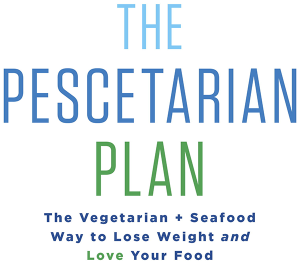5 Healthy Reasons to Become a Pescetarian
By Janis Jibrin, RD
Look around the world and many of the longest-lived (and healthiest) people are eating along the lines of The Pescetarian Plan. In other words, they’re eating a plant-based diet with the addition of seafood, with little to no meat. The Pescetarian Plan puts a Mediterranean spin on pescetarian, making this famously healthy diet even more protective.
Besides being so delicious, here are five health reasons to become a pescetarian:
- Your waistline.
Pescetarians are, on average about 20 pounds lighter than meat eaters. That’s because you get the satiating, appetite-quelling effects of fish protein without the fat and calories of burgers, bacon, sausage and other meat products. What’s also at work: the pound-paring effects of fruits and vegetables, a mainstay of pescetarian cuisines like the Mediterranean diet (and The Pescetarian Plan). - Your heart.
There’s a reason the American Heart Association recommends at least two fish servings per week: copious research shows that people who eat more fish are less likely to develop heart disease.Why? Fish, especially the fattier types like salmon, sardines and trout—is the only food that contains the more potent type of omega-3 fat which helps douse inflammation in the body. (Plant sources of omega-3 are also healthy, but not nearly as effective.) Inflammation is the first step in the process that causes plaque to form in the arteries—a major cause of heart disease. - Your sex life.
Men consuming a Mediterranean diet (fish is the primary animal protein) are less likely to develop erectile dysfunction, and women on this diet are also more apt to be sexually active and have less sexual dysfunction. In the same way fish’s omega-3 fats help keep arteries to the heart clear, they help keep arteries to sexual organs in good shape. - Your lifespan.
People who take in more omega-3s, especially the type found in fish, lived an average of 2.2 years longer than those taking in few omega-3s, according to a Harvard Study published last year. (Meanwhile other studies show that meat-eaters die sooner.) - Your brain.
Fish truly is “brain food” and its effects show up early: Moms who eat more fish during pregnancy have smarter babies. They’re also less like to be hit with post-partum depression. Depression is less likely among fish eaters in general, (including cross-cultural research showing depression rates up to 65 times higher in countries where people don’t eat much fish compared to those where fish is a staple). Brain benefits extend throughout life—fish eaters are less likely to develop Alzheimer’s disease or other forms of dementia.Our brains need omega-3s to function properly—they’re in the lining of all our brain cells, facilitating communication, and they even play a role in creating brain chemicals. Their anti-inflammatory powers help keep arteries leading to the brain open, staving off strokes and vascular dementia.
